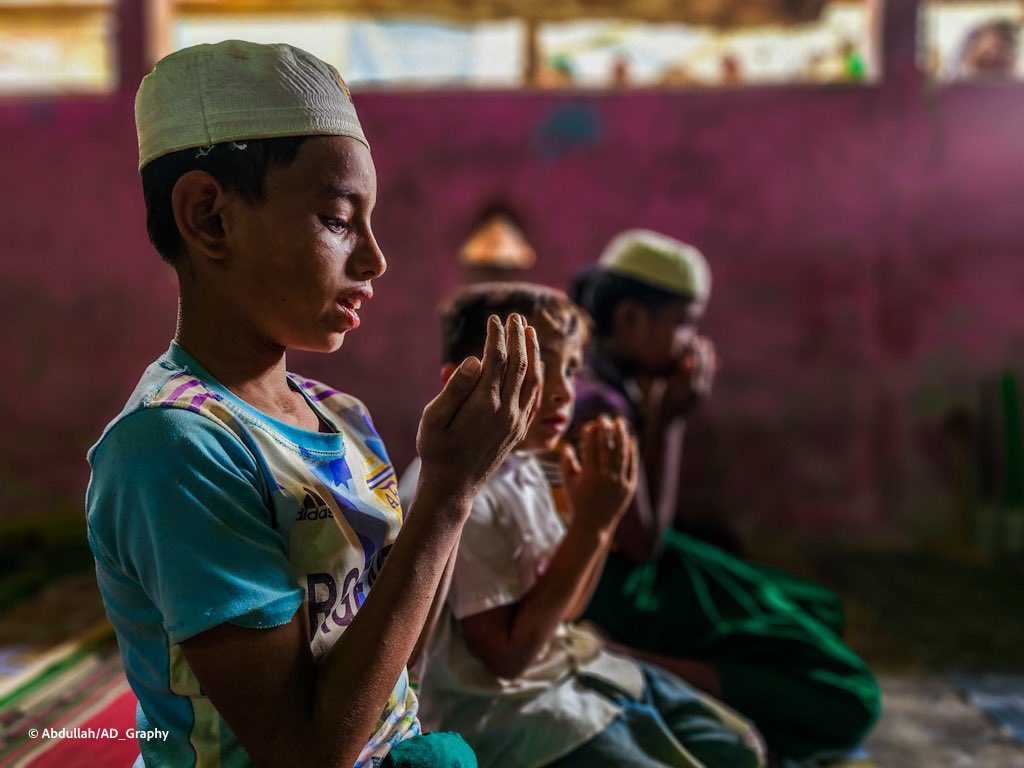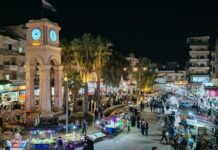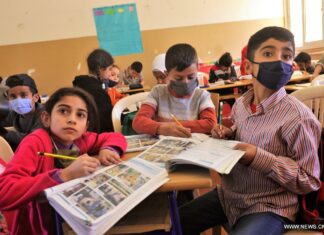
For centuries, the Rohingya, a Muslim ethnic minority whose homeland is Arakan, which is part of present-day Myanmar, have faced systematic discrimination. Massive waves of violence and displacement against the Rohingya began in 1978, and despite living on their land for centuries, they were denied citizenship in Myanmar since 1982. However, in 2017 things escalated and the Rohingya endured an extreme onslaught of attacks and forced displacement aimed at their expulsion and ethnic cleansing, with over 742,000 fleeing to Bangladesh. Today, over a million Rohingya refugees reside in Cox’s Bazar, Bangladesh, enduring overcrowded camps, fires, flooding, and health crises. As they grapple with ongoing conflict and natural disasters, international organizations like the UNHCR struggle to provide crucial assistance, while advocacy groups seek a solution for the now stateless victims of ethnic cleansing.
In the sacred month of Ramadan, where Muslims worldwide engage in fasting, prayer, and reflection, the Rohingya Muslims find themselves amidst a profound struggle. Forced into exile, expelled from their lands, and subjected to ongoing persecution, the Rohingya face unimaginable challenges as they endeavor to observe Ramadan. From days of tranquility to the present turmoil, the journey of the Rohingya has been one of hardship and sacrifice.
Memories of Peaceful Years
Prior to the expulsion and the harrowing campaign of ethnic cleansing orchestrated against them, Ramadan held a distinct significance for the Rohingya. It was a time of communal unity, familial gatherings, and devout worship. Families would come together to break their fast, mosques echoed with the recitation of the Quran, and the spirit of generosity flourished. Life, though marked by challenges, was imbued with the tranquility of religious devotion.
Nay San Lwin, Co-founder of Free Rohingya Coalition, spoke to L24 about their struggles while reflecting on the significance of Ramadan for the Rohingya community before their displacement. “Ramadan is considered a blessed month for Muslims worldwide, and for the Rohingya, it is no different. We observe Ramadan by fasting from dawn until sunset, engaging in increased prayer, reading of the Quran, and performing acts of charity and kindness.” Yet, says Lwin Ramadan has also been a poignant time tinged with sadness and solemnity as the long-suffering people felt the absence of family and friends, “Since the 70s, during Ramadan, those who lost loved ones and were displaced recalled those memories.”

Abdullah, a photojournalist, and activist living in Cox Bazar, the world’s largest refugee camp housing between one to one and a half million Rohingya, reminisced about the vibrant atmosphere preceding Ramadan in Arakan, now Rakhine State, Myanmar. “I still remember, the children used to wait, playing in the fields from Asr time (late afternoon) to observe the moon of Ramadan and the adults and elders walked to an open area in the fields after Maghrib (sunset) prayers – to look for the moon.”
“Back in Arakan,” Abdullah told L24 wistfully, “Ramadan was the greatest special month for Rohingya, we used to prepare everything to welcome Ramadan, buying a huge amount of things – for iftar (evening meal to break the fast) and suhoor (predawn meal) – such as chick-peas, oil, onions, garlic, banana, sugar, powdered energy drinks. Some adults used to buy new prayer caps and miswak (twigs of the arak tree used to brush the teeth), especially for the month of Ramadan.” It was also a month of community and charity says Abdullah, as the people used to distribute food and funds among the poor.
Yet all of that changed in 2017 when his people were attacked, their homes and communities destroyed and pillaged, none were spared, many men, women, children, and elderly were murdered and women and girls were subjected to rape and sexual violence so the Rohingya were forced to flee.
Transforming Traditions in the Shadow of Genocide
The ongoing genocide has shattered the serene landscape of Ramadan for the Rohingya, forcing profound changes in their traditions and practices. With the specter of violence looming large, the norms of the season have been irrevocably altered. Fleeing their homes, and grappling with loss and trauma, the Rohingya have been compelled to adapt their observance of Ramadan amidst displacement and despair.
Lwin describes the challenges Rohingya Muslims face in observing Ramadan amidst displacement and persecution, “Since the Rohingya have been attacked and displaced, observing Ramadan has become much more challenging. Many Rohingya now live in refugee camps or precarious conditions, lacking basic necessities and facing ongoing persecution.”

Chief among them is greeting the familiar month of joy, reflection, and charity under circumstances that make such practices nigh impossible to maintain, “The most difficult aspect of Ramadan for the Rohingya in the current situation.” posits Abdullah, “is likely the disruption of traditional practices, including communal iftars and prayers. While adapting to new circumstances, most may find it challenging to maintain their usual observances.” This becomes more acute due to the prevalence of poverty.
Today, most families are unable to work, due to restrictions by local governments and a lack of citizenship or legal recognition in either Myanmar or Bangladesh. While organizations like the UN provide a stipend of $10.00 USD per month per person, Lwin mentions that it’s not sufficient to procure even the most basic necessities let alone allow the people, especially the children to experience Ramadan like before.

Eid al-Fitr is the day following the end of Ramadan, a celebratory time when Muslims around the world eat sweets, come together, and congratulate one another on having completed the month of fasting and worship asking that Allah accepts their good deeds. For the Rohingya, it was no different as Lwin explains, “Eid al-Fitr is the most joyous occasion for the Rohingya. Families come together to share meals, exchange gifts, and offer prayers of gratitude. It is a time of happiness and solidarity within the community. Children go house to house to receive Eidi (gifts of money typically used to buy sweets) and having new clothes on Eid day is necessary.” For people displaced, dispersed, and destitute these customs are now out of reach for most families.
Even cooking meals or using lights could be dangerous, as the Rohingya were chased and hunted, “During the years of attack,” says Abdullah, “it was very difficult to do all the things we used to. There were days that we had to break our fasts with cold food, cooked during the daytime because using lights at night was restricted.” Gathering for voluntary night prayers known as taraweeh, as synonymous with fasting during the month of Ramadan, was also impossible.
Yet, Lwin notes optimistically, “Despite the challenges, Rohingya refugees strive to maintain the spirit of Ramadan as best as possible. We continue to fast, pray, and seek closeness to Allah. Organizations and individuals often come forward to assist during Ramadan, distributing food and aid to those in need. While the observance may not be the same as it was before displacement, the resilience and faith of the Rohingya people remain strong, and we continue to hold onto hope for better days ahead.”
Hope Amidst Despair
Despite the desire for a way out and the hope for a better future, many Rohingya remain trapped in a cycle of fear and uncertainty. They aspire for a resolution to their estrangement and suffering, yearning for justice, recognition of their rights, and a pathway to return to their homeland in safety and dignity. According to Lwin advocacy, humanitarian aid, and diplomatic pressure and intervention are imperative to addressing the crisis and upholding the principles of justice and compassion within the Ummah. “All of the Ummah should be united and speak with one voice. They should raise their voices for fellow Muslims, regardless of race and nationality. Currently, geopolitical and business interests take precedence over humanity towards the Ummah. This is the very reason why the Ummah is suffering.”

Abdullah also expresses his views on the importance of Ramadan and the broader aspirations of the Ummah, “The solution to the current state of Muslims is trying to bring back the caliphate (Pan-national Islamic governance),” a system akin to the European Union, which would unite all Muslim majority nations – and a goal of many in the Muslim world today.
In the end, all that can be done, believes Lwin, is to do one’s best and then turn to Allah, “All we can do ay more and more for humanity,” once this is achieved, he says, “no one will remain idle when any part of the Ummah suffers.”
In the midst of exile and adversity, the Rohingya Muslims persevere in their observance of Ramadan, drawing strength from faith and resilience. Their journey exemplifies the enduring spirit of devotion amidst hardship and the imperative of collective action in confronting injustice. As Ramadan draws to a close, the plight of the Rohingya should be remembered, and raising awareness of their situation and striving for a solution should continue throughout the rest of the year until they can return home in safety and dignity.








